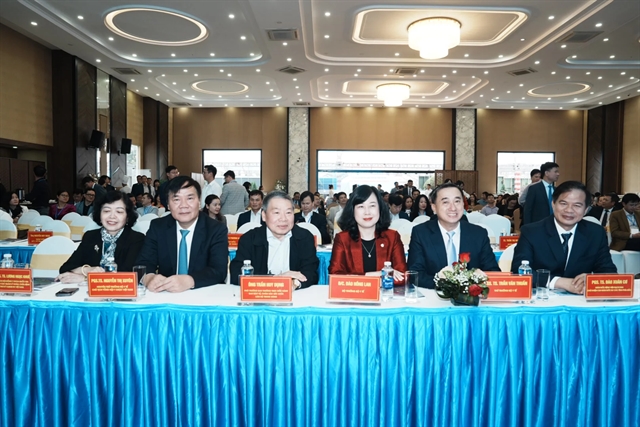 Society
Society

 |
| Minister of Health Đào Hồng Lan (third from right) and Deputy Minister of Health Trần Văn Thuấn (second from right) at the conference. — VNA/VNS Photo |
HÀ NỘI — Hospital leaders have recently raised concerns over regulations of medicine and medical equipment procurement activities with policymakers from the Ministry of Planning and Investment (MPI).
Minister of Health Đào Hồng Lan highlighted at the 2024 Northern Hospital Directors Club conference that shortages of medicine and medical equipment in some public health facilities have increased since the peak of COVID-19 prevention and control efforts. However, concerted efforts to mitigate these challenges and ensure uninterrupted healthcare services have been undertaken by the Party and the Government, central ministries, localities and the healthcare sector.
Lan further mentioned that following the expiration of Government Resolution 30 on December 30, 2023, hospitals addressed immediate procurement challenges. Subsequent actions include the implementation of the amended Healthcare Examination and Treatment Law and the Bidding Law, effective from January 1, 2024.
Promptly responding to the situation, the Government issued Decree 24/2024/NĐ-CP on February 27, providing detailed regulations on bidding processes, particularly for procuring medicine and medical supplies, thereby facilitating hospital procurement activities.
Immediate implementation
Regarding Decree 24, discussed at the Northern Hospital Directors Club conference, Hoàng Cương, head of the Policy Department at the Procurement Management Agency of the MPI, stated that since January 2024, when the new Bidding Law came into effect, over ten thousand bidding packages for various sectors have been issued according to the new law, including procurement packages for healthcare.
According to Cương, on February 27, the Government issued Decree 24 detailing provisions and measures for implementing the Bidding Law regarding contractor selection, providing a basis for hospitals to immediately initiate procurement activities without waiting for additional guidance.
Cương also emphasised: The new Bidding Law and Decree 24 introduce several new points, making bidding for medicine and medical supplies more convenient, allowing for direct selection in case of emergencies, or in some situations to ensure the regular operation of hospitals. Additionally, there are new procurement methods such as transparent online bidding on the national bidding portal, where hospitals can purchase replacement components within 3-4 days if needed.
Cương explained that Decree 24 allows hospitals to determine bidding prices based on quotations, even if there is only one quotation, it can be used as the estimated price for the bidding package, or if there are multiple quotations, the highest quoted price can be used. This is a significant new feature compared to previous regulations.
Furthermore, hospitals can apply an option to purchase up to 30 per cent more than the previous procurement package. The new regulations empower investors to identify obstacles and challenges to overcome.
Director of Bach Mai Hospital Đào Xuân Cơ said that when bidding for medicine and chemicals, it is not necessary to have three quotations as before. Moreover, the decree allows including the origin of goods in procurement dossiers, disclosing countries, regions and territories according to the hospital's financial capacity and patient treatment needs. This is a new favourable step for hospitals to implement procurement and bidding in the future.
Challenges remain
Nguyễn Văn Thường, director of Hà Nội-based Đức Giang General Hospital, also shared that Decree 24 helps hospitals address many practical issues. Specifically, the decree clearly outlines the bidding process, including the necessary steps and available forms for bidding implementation.
However, in the exchange and discussion at the conference as well as the sidelines, many hospital leaders expressed concerns about the honesty and accuracy of quotations for medical equipment and supplies provided by businesses. Hospitals are worried that purchasing at high prices may lead to asset losses during audits in the future.
Cơ mentioned that when businesses provide quotations, declarations through the system are not necessarily ensured, as businesses may inflate prices. "This is common when many businesses establish multiple companies, and the winning company increases prices, putting investors in a situation of buying at high prices, and when audited, there are irregularities," said Cơ.
Additionally, according to feedback from many hospital leaders, to conduct extensive bidding for a large number of healthcare facilities, they still need to wait for guiding circulars. Many hospital representatives admitted that it is not easy to bid for sufficient medicine and supplies.
Regarding this issue, Cương explained that quoting prices is the right of businesses, and businesses must be responsible for their quotations. Suppose the investor, which is the hospital, finds that the quotation is not accurate. In that case, they can refer to quotations widely published on the Ministry of Health (MOH)'s electronic portal for comparison. If the business quotes a high price and the investor finds it inappropriate, they can choose another business.
Currently, the MOH and the MPI are developing guiding circulars for Decree 24 to be applied in procurement and bidding by hospitals. — VNS




